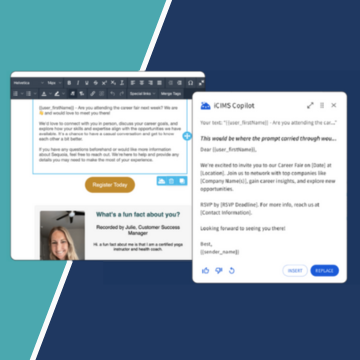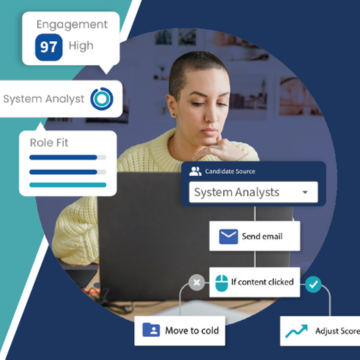- Solutions
- Products
- Community
- Resources
- Company
Create incredible candidate experiences that communicate your brand, mission, and values with recruitment marketing solutions.
Learn moreCommunicate effectively and efficiently with the candidates that can drive your business forward.
Learn moreSelect the right candidates to drive your business forward and simplify how you build winning, diverse teams.
Learn moreHelp your best internal talent connect to better opportunities and see new potential across your entire organization.
Learn moreCommunicate collectively with large groups of candidates and effectively tackle surges in hiring capacity.
Learn moreAccess tools that help your team create a more inclusive culture and propel your DEI program forward.
Learn moreRebound and respond to the new normal of retail with hiring systems that are agile enough to help you forge ahead.
Learn moreAccelerate the hiring of key talent to deliver point of care and support services that meet and exceed your promise of patient satisfaction.
Learn moreAttract and engage candidates with technical competencies, accelerate hiring for much-needed skills, and advance expertise within your valued workforce.
Learn moreSimplify how you recruit finance, insurance, and banking candidates with a unified platform built to match top talent with hard-to-fill roles.
Learn moreYour business strategy depends on your people strategy. Keep both in lockstep with the iCIMS Talent Cloud.
Learn moreBuild an engaging, high-converting talent pipeline that moves your business forward.
Learn moreDeliver the innovation your talent team needs, along with the global scale and security you demand.
Learn moreDeliver tailored technology experiences that delight users and power your talent transformation with the iCIMS Talent Cloud.
Learn moreThe #1 ATS in market share, our cloud-based recruiting software is built for both commercial and large, global employers.
Learn more Talk to salesAttract the best talent for your business with powerful, on-brand career websites that excite candidates and drive engagement.
Learn more Talk to salesCombine behavior-based marketing automation with AI insights to build talent pipelines, engage candidates with multi-channel marketing campaigns, and automatically surface the right talent for the job.
Learn more Talk to salesEmpower candidates with automated self-service, qualification screening, and interview scheduling through an AI-enabled digital assistant.
Learn more Talk to salesSimplify employee onboarding with automated processes that maximize engagement and accelerate productivity.
Learn more Talk to salesVerify skills with game-changing levels of automation and simplicity to improve the quality of hire at scale.
Learn more Talk to salesModernize, streamline, and accelerate your communication with candidates and employees.
Learn more Talk to salesTransform the talent experience by showcasing your authentic employer brand through employee-generated video testimonials.
Learn more Talk to salesSimplify recruiting, dynamically engage talent, and reduce hiring bias with job matching and recruiting chatbot technology.
Learn moreStreamline and centralize your HR tech stack with configurable, flexible, secure and reliable integrations.
Learn moreHow a beloved restaurant hires 40,000+ annually with a great candidate experience.
Learn moreThousands strong, our global community of talent professionals includes creatives, innovators, visionaries, and experts.
Learn moreTogether we’re creating the world’s largest ecosystem of integrated recruiting technologies.
Learn morePartner with our global professional services team to develop a winning strategy, build your team and manage change.
Learn moreExplore our network of more than 300 certified, trusted third-party service and advisory partners.
Learn moreUncover unique market insights, explore best practices and gain access to talent experts across out library of content.
Get resourcesExpert guidance about recruitment solutions, changes in the industry, and the future of talent.
Learn moreStay up to date with the latest terminology and verbiage in the HR software ecosystem.
Learn moreEmployers everywhere improve hiring efficiently and save money using iCIMS. Estimate the potential business value you can achieve.
Learn moreDive into the Class of 2023 Report highlighting this cohort’s expectations and where employers are willing — and able — to meet them.
Watch nowPartner with iCIMS to build the right strategies, processes, and experience to build a winning workforce.
Learn moreExpert guidance about recruitment solutions, changes in the industry, and the future of talent.
Learn moreDeliver the innovation your talent team needs, along with the global scale and security you demand.
Learn moreView press releases, media coverage, and the latest hiring data. See what analysts are saying about iCIMS.
Learn moreiCIMS is the Talent Cloud company that empowers organizations to attract, engage, hire, and advance the talent that builds a winning workforce.
Learn moreGet to know the award-winning leadership team shaping the future of the recruiting software industry.
Learn moreWe believe the future of work isn't something that "happens" to you. It's something you create. We actively create the future of work with our customers every day.
Learn moreiCIMS is committed to being a responsible and ethical corporate citizen, which is why Environmental, Social and Governance (ESG) initiatives are strategic imperatives.
Learn moreStreamline your tech stack and take advantage of a better user experience and stronger data governance with ADP and the iCIMS Talent Cloud.
Learn moreThe combined power of iCIMS and Infor helps organizations strategically align their business and talent objectives.
Learn moreOur award-winning partnership with Microsoft is grounded in a shared desire to transform the workplace and the hiring team experience.
Learn moreOur partnership with Ultimate Kronos Group (UKG) supports the entire talent lifecycle by bringing frictionless recruiting solutions to UKG Pro Onboarding.
Learn moreLet’s get in touch. Reach out to learn more about iCIMS products and services.
Learn more

The average person makes nearly 35,000 decisions a day. We often opt for path of least resistance – relying on our experiences, emotions, and peer recommendations to guide us.
But, when it comes to recruiting, the stakes are higher, and the consequences can be much greater, than for most daily decisions. It’s important to make a more conscious effort and get off autopilot mode – otherwise, biases can creep in and potentially lead to homogeneous hiring.
To help solve this challenge and create more equitable hiring processes, we’re excited to release resume redaction within iCIMS Applicant Tracking. Now you can automatically block personal identifiers from a resume review. By removing non-essential information from what they see first, hiring teams can zone in on skills, qualifications, and firsthand experience.
You are likely already familiar with the value of hiding identity to recognize talent with less bias interference from the entertainment world. iCIMS’ Culture Belonging Inclusion and Diversity Director, Chinor Lee, gives an example:
“There are multiple popular talent shows that hide the artist from the judges in some way. Perhaps the judges have their backs to the artist or maybe the artist is hidden behind an avatar. Either way, the objective is to find the most talented candidate. In the same way, we can hide identifying information during the hiring process.”
Resume redaction can help to mitigate biases and build a more diverse candidate slate by anonymizing information that’s not necessarily found to be relevant to performance. Once the settings in your ATS are defined you can feel confident that candidates are being reviewed primarily on their qualifications and skills to get the job done.
For example, you may want to allow all talent acquisition leaders to have access to all information at ATS login, whereas for hiring managers you might redact their view up until they have approved someone for an interview.
Our personal identifiers represent our heritage, family, and history, and unique traits should be embraced by organizations. But the reality is that our subconscious and cognitive shortcuts can still inform our decision making despite training efforts.
“The goal with resume redaction is to keep the focus on skills and potential to get a wider range of diversity through the first decision point,” says iCIMS Product Manager, Amber Brown. “We have heard testimonies of candidates and hiring teams that speak to challenges with hiring from distinct universities. With resume redaction, we want to help hiring teams become more open-minded by surfacing candidates using AI in the iCIMS Talent Cloud and adding redaction as to not distract first decisions with datapoints like university.”


Resume redaction in the iCIMS ATS is one way you can look to minimize the effect of unconscious biases in the hiring process. As Brown put it, “There are so many examples of where this practice can be impactful, including but not limited to names. For example, by eliminating “university” from initial view you can address elitism that can pop up when you screen profiles from community colleges, boot camps, or non-traditional career paths.”
Enabling this new feature can help address:
Not sure where to start? Here are the most popular fields you can redact from your team’s view within iCIMS ATS – and some insight into how they can sway decisions:
———–
You can learn how to be more intentional with language, focus on skills, and make improvements with technology in a recent on-demand webinar. Click here to watch: How to mitigate bias in the hiring process, hosted by Chinor Lee and Melissa Dobbins, Founder and CEO at Career.Place.





